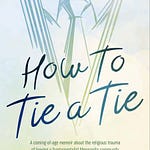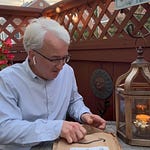I thought I’d take you behind the scenes, and share with you some thoughts I had as I was preparing to post the preface and the prologue of my memoir How To Tie A Tie, which I just posted on Sunday evening.
First, some notes on the editing process:
I love that it’s forcing me to edit it steadily: I love the systematic schedule. It’s how I work.
I was surprised by how ready the manuscript feels. I did very little revision. Now this may be because I’ve read these two pieces the most often, or it may be indicative of the readiness of the entire book. I hope it’s the latter.
I know that the editing I’m doing on the first chapter is taking longer. I think the voice is off. So, we’ll see. But the key is, I’m loving the editing process.
Second, I wanted to talk about how this process feels to me: I’m definitely in a different place than I was when I wrote it.
I’m really happy that I’ve made the commitment to honesty, which I learned from memoirist Mary Karr (The Liar’s Club). She literally broke the delete key on her computer while writing one of her memoirs. Knowing that the most important thing about this memoir is that I be honest with my reader is reassuring.
With that said, I realize now that something happened to me after I defined myself in my first piece I wrote for the substack: “This is who I am.” I’ve discovered a new freedom in writing.
This comes down to two things:
First, when you are authentic, not everyone will like your work; and
Two, when you are authentic, your real audience can find you. These are the people you are writing for. These are the people who love what you write. These are the people who appreciate you for who you are; and
Three, I guess that’s what you call “finding your voice.” I don’t want to lose this. It’s one of the reasons I’ve decided to be clear about my political beliefs. They come out of my faith. I cannot believe something that is antagonistic to who Jesus is.
So it’s okay if you don’t agree with or even like my beliefs -- the beautiful thing about substack is you can find authors who write the way you believe. I’m 100% on board with that.
So to conclude, I believe that when you are clear about your values, decisions become much clearer. When you are clear about your values, you can make those decisions quickly. And when you are clear about your values, there’s no confusion. Those values will guide your decision-making.
So how does this affect my writing?
I realized I couldn’t finish this memoir until I decided what my values were. I needed to know what I believed. And what I believe is not what my family and my community believe.
Which is why I left.
For me, a primary value is autonomy -- giving people the right to choose their life journey, not trying to use guilt and the fear of hell to keep them within the fold.
I’ll have more to say about this in the future. For now, I’ll leave it there.
If you prefer to watch this on YouTube, you can find it here.











